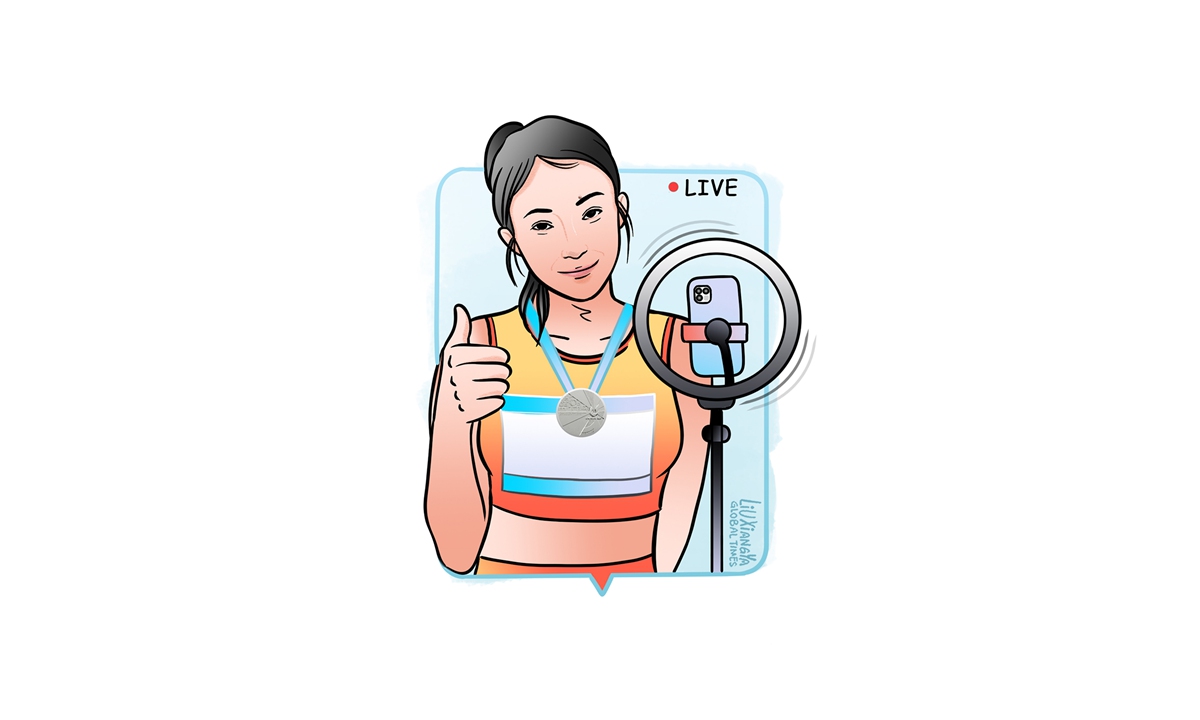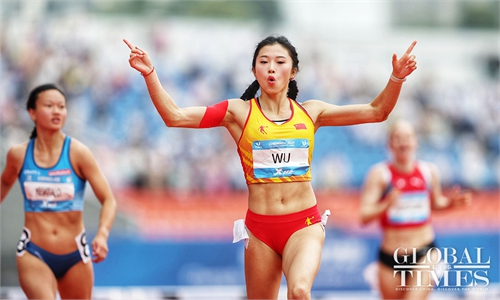ARTS / CULTURE & LEISURE
Star hurdler responds to accusations of livestreaming

Illustration: Liu Xiangya/Global Times
Chinese star hurdler Wu Yanni, who won a silver medal in the women's 100 meters hurdles at the FISU World University Games, disputed accusations that participating in public activities like livestreaming could affect her achievements as an athlete.
Wu's recent achievements at the Chengdu Universiade, held in the capital of Southwest China's Sichuan Province, have propelled her into the limelight. On August 4, her stellar performance in the women's 100 meters hurdles was a new personal best and secured her a silver medal with a time of 12.76 seconds, which also qualifies her for Paris Olympic Games.
After her win, Wu, 26, told the Global Times that the overwhelming support she had received had everything to do with her success in the Games.
"Competing at home makes me more relaxed and gives me more impetus than pressure," noted the Sichuan-born athlete.
Yet, her appearance at a livestreaming platform has inevitably sparked debate about the confluence of sports, entertainment and commercial interest.
Wu has attracted more than 1.88 million followers on Douyin, the Chinese version of TikTok. After the Chengdu Universiade, she hosted a livestreaming session to interact with her supporters.
Many viewers were eager to take this opportunity to chat with the athlete, praising her success in the sport and asking her advice about diet and bodybuilding. They got to learn things that haven't been covered by the media about the up and coming track star by simply asking her directly during the livestream. Some fans bought various virtual gifts for Wu, which can be converted to money, to show their support and appreciation.
At the same time, some raised the question, "Is she capitalizing on her recent success for quick gain?" This sentiment was echoed across various online forums and social media platforms. Furthermore, not long after the Chengdu Universiade, Wu was named as a brand ambassador for a Chinese auto company.
Some brought this criticism into one of Wu's livestreaming sessions, asking her whether she is giving up her identity as an athlete, and striving to be a social media influencer. Wu hit back without hesitation, saying that she had no such intention, and she didn't need to do so.
She argued that if she had financial troubles, she wouldn't be jumping hurdles, indicating the money earned in the sport was not as much as the public thought.
"Athletes, like all of us, are multifaceted individuals with a range of interests beyond their sport. Livestreaming or engaging in any form of entertainment is a personal choice. If it doesn't hinder their professional commitments, I don't see why they shouldn't explore these platforms," commentator Luo Le pointed out.
Luo noted that livestreaming offers unique two-way interaction. Fans get unprecedented access to their sports heroes, while athletes receive real-time feedback, support, and sometimes criticism. This dynamic can foster a deeper bond, but it also exposes athletes to the volatile world of online opinions.
"As we move forward, it's crucial to remember that athletes, despite their superhuman feats on the field, are humans off it. Their choices to engage in activities outside their professional realm should be seen as extensions of their personalities, not as detractors from their primary profession," said Luo.
While many lauded Wu for her openness, she wasn't immune to criticism. This also wasn't the first time Wu has been caught in the middle of controversy.
Wu has a crown shaped tattoo, surrounded by blooming flowers on her right upper arm, which she regards as a personal source of motivation. It became a point of contention for some netizens. Even though she covers it with tapes when competing, some argue that as a public figure, she should have been more prudent about tattoos due to her influence on children.
In 2022, according to the rules approved by the Minors Protection Department of the State Council, all companies, organizations or individuals are forbidden from providing tattooing services to minors. No advertisements, books, journals or digital publications shall include content that could induce minors to get tattoos.
In 2021, the Chinese General Administration of Sport banned national soccer team players from having tattoos, and for those already with tattoos, they are advised to remove or cover them during training and competitions.
The author is a reporter with the Global Times. life@globaltimes.com.cn

